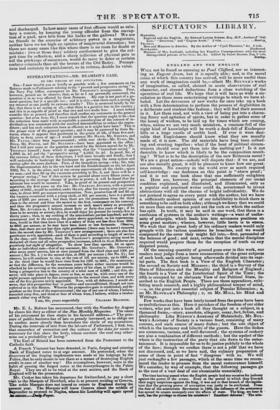SUPERANNUATION S—MR. BEAMISH'S CASE.
TO THE EDI l'OR OF THE SPECTATOR.
SIR—I now trouble you as briefly as possible with a few comments on the Returns made to Parliament relating to the " present and prospective saving': in the Navy Pay Office, consequent on Mr. THOMSON'S arrangements. First, however, permit inc to observe, that, so far as I am personally concerned, the question is in no way affected by these Returns. My case is not part (Asa ge- neral question, but is a specific one ; and it is this—was there such a saving by my removal as can justify its extreme cruelty ? This is answered briefly by the lac'. that there is no saving at all,—that there is a positive loss to the country ; and this is as capable of proof as that two and two make four. I must indeed consider this as proved, and therefore shall confine my comments to the general question : hut even here, Sir, I must remark that the question ought to be—has the reduction been made with as equitable a consideration of the interest of in- dividuals as was consistent with the resolved determiation to reduce the expen- diture; and has such reduction been as efficient as it might have been? This is the proper view of the general question ; and it may be answered by these Re- turns, where it appears that gentlemen in the prime of life, of from five-and- thirty to forty years of age—I would instance Mr. HAND, Mr. SMIRKE, and Mr. PAYNE—have been superannuated ; while new clerks—Mr. Eras, Mr. REID, Mr. POUND, and Mr. STANDEN—have been appointed to the office ! But I will now come to the question as raised by the Return moved for by Mr. THOMSON himself; from which it appears, that the "immediate saving" is 1,090/. 2s. 4th and the "prospective saving" 4,505/. 2s. 4d. In proof, Sir, of the extreme fallacy of these deductions, I will state broadly and briefly, that I will undertake to bankrupt the Exchequer by pursuing the same system and saving after the sonic fashion. First, of the immediate saving—why, Sir, take the Superannuation Act in the one hand and the Establishment on the 1st April 1832, No. 1, in the other, and at one sweep superannuate all the clerks—spare no man—and then fill up the vacancies according to No. 2, and there will be a " present saving ;" but if this system be pursued about every fifteen years, or according to the average change of parties in power, it will be found that the ultimate loss would be immense. Take, in proof of its present and prospective operation, the first name on the list : Mr. CHARLES AYLMER, with a present salary of 8001., would be entitled, under the act, after his twenty-nine years' ser- vice, to about 480/. per annum superannuation. Now, pension him off and fill up the vacancy occasioned with a young clerk, at 90/. per annum ; here is a present gain of 2301. per annum ; but then, there are the promotions from the third class to the second and from the second to. the first, consequent on his removal, and then the progressive annual increase on each man's salary so promoted. Now, Mr. AYL3IER is, I believe, about forty or forty-five years of age ; if he lives to be seventy or seventy-five, he would enjoy his pension for twenty-five or thirty years ; then, to say nothing of the intermediate parties benefited, and the consequent cost to the country, the junior above appointed, on his superannua- tion, would in that time have risen to a salary of from not lees' than from 300/. t6-6001. per annum, as he may have been more or less fortunate. Observe, then, that there are not less than eight gentlemen (there may be more) removed into the second class by Mr. THOMSON'S new arrangements ; there are also five gentlemen newly appointed—each of these is paid according to length of service an the class—and therefore, from Mr. TaroarsoN's prospective saving must be deducted all these and all other prospective increases, which in thzse Returns are positively lost sight of altogether. To show how they operate, let us again take an individual case—that of my successor, Mr. GODFRET. Mr. GODFREY, after seven years' service, has at once jumped from the third class and 130/. per annum (See No. 1.) to the second class, at 300/. per annum (See No. 2); but observe, he will continue to rise, at the rate of 10/. per annum, up to 5001., as in the third class he would have risen from his 130/. to 3001., the maximum; so that the difference, for the seventeen years before either increase would be checked, by his arriving at the maximum salary of his class, is 1701. per annum, being a prospective loss to the country of a total sum of 2,8901.; and this, ob- serve, will take place in degree, more or less, as may be, with every one of the eight persons appointed by this arrangement to the second class, and with every one of the five persons newly appointed. Now, with all deference, I would ob- serve, that this prospective loss is positive and unconditional, though not even referred to in this Return. Whereas the prospective gain is conditional, and de- pendent on the lives of the superannuated ; the age of not one of whom, I believe, exceeded sixty-five, and three or four of whom were, I believe, within a twelve- Month either way of forty.


















 Previous page
Previous page